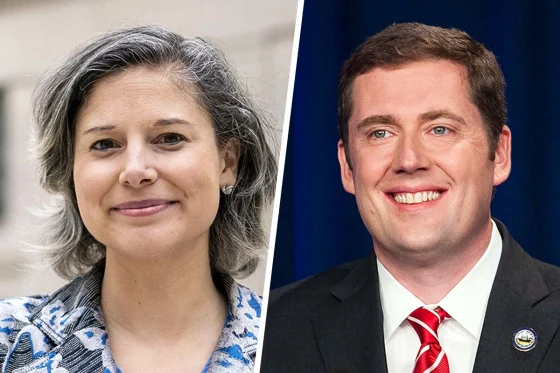On Tuesday, voters in New Hampshire’s 2nd Congressional District will choose a new member of Congress for the first time in 12 years, igniting a fiercely contested and costly Democratic primary.
Former New Hampshire Executive Councilor Colin van Ostern and former Department of Justice Deputy Assistant Attorney General Maggie Goodlander are vying for the Democratic nomination to succeed six-term Rep. Annie Kuster, who is retiring.
Van Ostern, who entered the race early and quickly secured Kuster’s endorsement, appeared to have a clear path to the nomination in a district considered “likely Democratic” by the nonpartisan Cook Political Report. However, his momentum was disrupted when Goodlander, a veteran congressional and legal staffer, announced her candidacy in May.
Goodlander, originally from New Hampshire and married to White House national security adviser Jake Sullivan, has gained significant traction since her campaign launch. She has garnered endorsements from EMILY’s List and former Secretary of State Hillary Clinton.
As the primary draws closer, tensions have risen, with significant financial resources pouring into the race. One notable shift has been the endorsement switch of former Governor John Lynch, a high-profile supporter of Van Ostern, who has now backed Goodlander.
Despite this, Van Ostern continues to receive support from prominent New Hampshire figures, including former state Democratic Party chairs Kathy Sullivan and Ned Helms, as well as former state Attorney General Joe Foster and former state Senate President Sylvia Larsen.
Focus on Reproductive Rights
Reproductive rights have become a focal point of the Democratic primary battle between Maggie Goodlander and Colin van Ostern, with both candidates launching sharp attacks on each other.
Van Ostern has emphasized his long-term commitment to reproductive rights, citing his support for Planned Parenthood during his time on the New Hampshire Executive Council. “Access to health care and reproductive rights have been central issues for me for over 15 years,” Van Ostern told NBC News. “New Hampshire voters can judge my dedication by my actions, not just my words.”
In response, Goodlander has criticized Van Ostern’s attacks as misleading. “My opponent’s criticisms are an attempt to undermine my commitment to reproductive freedom, despite his awareness of my professional background,” she said.
Goodlander has spotlighted her own credentials on the campaign trail, including her experience clerking for former Supreme Court Justice Stephen Breyer and her work at the Justice Department following the Supreme Court’s 2022 decision to overturn Roe v. Wade. She has also shared her personal struggles with reproductive health in her campaign ads, including a poignant story about losing her son at 20 weeks of pregnancy. “I’ve faced my own painful battles,” Goodlander said in one TV ad. “Yet he still questions my commitment to reproductive freedom.”
Both candidates have also scrutinized each other’s affiliations with Republicans. Van Ostern has criticized Goodlander for her previous work with the late GOP Sen. John McCain and her donations to Republican candidates, suggesting these ties undermine her stance on reproductive rights. “Supporting Republicans who oppose abortion rights is problematic,” he said during a recent debate hosted by WMUR.
Goodlander countered by pointing out Van Ostern’s own connections, referring to his role as a spokesman for anti-choice Rep. Jim Turner. “It’s wrong and disgraceful for him to question my commitment to reproductive rights,” Goodlander told NBC News.
The heated exchanges over reproductive rights have become a defining feature of the primary race, with both candidates fiercely defending their records and positions.
An Exceptionally Costly Race
Van Ostern has targeted Goodlander for her backing from super PACs and out-of-state donors.
Since Goodlander entered the race in May, over $3.5 million has been spent on digital, radio, and TV ads by both campaigns and outside groups, according to AdImpact.
Van Ostern has criticized this influx of external funding as a major issue in the race. “The amount of outside money flooding into this primary is meant to confuse voters,” he told NBC News. “We won’t allow powerful, out-of-state dark money groups to dictate the outcome.”
Vote Vets, a Democratic organization focused on electing veterans to Congress, has been one of the largest contributors, spending more than $900,000 on ads supporting Goodlander, according to AdImpact. Goodlander has defended this support, arguing that these are not dark money groups but organizations working to elect more pro-choice women and veterans. “I have strong backing from veterans across New Hampshire and the nation, including Vote Vets,” she said.
The increased scrutiny and contentious atmosphere have led to significant shifts in endorsements. Former Governor John Lynch, who had initially supported Van Ostern, has switched his endorsement to Goodlander. Lynch cited his dissatisfaction with Van Ostern’s campaign tactics as the reason for his decision. “I respect Colin, but I cannot support the way his campaign has been conducted,” Lynch explained. “The growing tension and negativity made me withdraw my support.”

